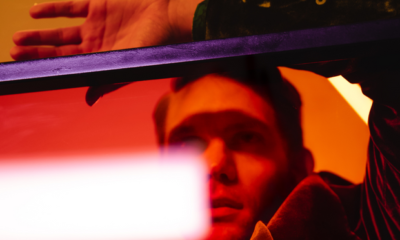Life
Perspective: It’s Never Been More Important

If you’d like to learn how to prioritize your life so you can experience the richness of it, sign up for the free 90-Day Master Class hosted by the founder of Addicted2Success.com, Joel Brown.
Perspective has many definitions because it can mean something different to each of us. When I think of perspective, I essentially think of the big picture. Putting situations in perspective is taking them beyond the moment themselves and placing them in the grand scheme of life and your goals. The purpose is to not give singular moments more credit than they deserve.
Putting moments in perspective allows us to relax and approach things in a controlled manner. I can’t think of another time where perspective and mindset were more important than they are right now. It’s not a matter of downplaying the situation, but rather facing it head-on and seeing it for what it truly is. I think it’s incredibly important to think about the path you’re on in life, specifically your approach.
This time has impacted us all in unique and mostly negative ways, including myself. However, this situation has been much easier to handle for some than for others. I think that’s in large part due to perspective. Without mental discipline, focus, and commitment, surely this time would be a lot to deal with. The goal of this article is to help you get past that and to make the rest of this experience as beneficial for you as possible.
Why putting things into perspective is so important
I’m no expert, so take my advice as you will. However, I’ve had lots of real-world experience specifically with perspective and mindset. I’ve drastically changed my life, how I interact with it, and my overall outlook simply through introspection, training my mind and keeping myself focused.
There was a time in my life where I was so depressed, so filled with constant anxiety, that I could barely even function. But through effort and dedication, I was able to slip out of this part of my life, lose 80lbs along the way, and excel in school and professionally. That doesn’t mean I’m not subject to hardship like everyone else.
Like many people, I lost my job because of this pandemic, but the difference for me was that my mindset and ability to put things in perspective was already sharp. Despite all that has happened, my focus has always been forward-looking and not letting the moment define me. Refining your mindset and utilizing perspective can make any situation manageable and allow you to realize your full potential in life.
When I talk about putting things into perspective, it’s important you know that doesn’t mean I’m saying to downplay moments or not care. The point is that we often get lost in the moment. Society is quick moving and we struggle to take a second to breathe. Even when we have all the time in the world to breathe, we struggle in seeing moments as part of the greater whole.
You can live in the moment, but don’t let small moments be so destructive internally. We must put the small moments in perspective so that we can better handle the big moments. This piece is about getting you to take control of the small moments first. Hopefully with these tools and pieces of advice, you’ll be able to establish a framework for the bigger occurrences in life.
“Accept responsibility for your life. Know that it is you who will get you where you want to go, no one else.” – Les Brown
Here are three strong ways to start utilizing and refining perspective in your life:
1. Stop, Breath, Think, React
For most people, it’s as simple as just taking a second before reacting. This is crucial for me, as my natural emotional reactions are almost always destructive rather than productive. Whether you’re the same way or not, slowing down and taking a breath is always a useful technique in life.
Before you blow up over just missing that subway train or on that guy who bumped into you, take a second, breathe, think, and then react. We all have countless moments every day like this. At the end of the day, is it that big of a deal if you miss that subway train? It’s these little moments that’ll start to make all the difference in your overall happiness levels once you start addressing them.
2. Reflect
Reflection is an important tool for so many aspects of life. As it pertains to perspective, reflection will allow you to refine your approach. As you reflect, you’ll be able to think about actions and how you want to move forward. Looking back at situations, you can see where you may have handled something the wrong way, or notice where your mindset was off.
Without reflection, I don’t believe it’s possible to address problem areas moving forward. Only by reflection can you expose these areas, think about them, and then input a strategy to address them moving forward. It’s important to know that the past can be very important and useful, but only if you use it to learn and not to dwell on it.
We all make mistakes and have bad days. If you have these moments, don’t get lost in your frustration, use them as a learning experience to avoid them in the future. Reflection can lead to incredible realizations, but it can also lead down a dangerous path if you let it. Beating yourself up about a moment that has already passed brings no value to you whatsoever, remember that.
Reflection’s key function as it relates to perspective is that it’ll allow you to be more aware of thoughts, actions, and feelings in real-time. You’ll be able to catch yourself in these negative ways of thinking and acting much easier, which gives you the chance to correct in real-time.
Reflection works like that, it’s not going to be clear cut or always work when you want it to. If you have an area you struggle with, then put it in the forefront of your mind and dissect it.
“I visualize where I wanted to be, what kind of player I wanted to become. I knew exactly where I wanted to go, and I focused on getting there.” – Michael Jordan
3. Know Where You’re Going
Ultimately the best way to focus on the things that matter is having an end destination or direction of some kind. Whether it’s a dream you have, a job you want, something you want to accomplish, or even a way you want to live, you should have something.
Direction is a powerful motivator in life and is incredibly useful in utilizing perspective. For example, I know the values I want to live by and the kind of person I want to be, yet I don’t have a clue where I’ll be in a year from now. Nonetheless, those values and personal characteristics are still incredibly useful for me.
When I find myself in moments in which I’m not acting or living in the way I wish, I’m able to refocus to get back on my desired path in life. You’ll begin to see how these small moments you’ve made such a big deal of, in reality have little impact on your ability to still achieve what you want in life.
Focus on what your priorities are in life, think about what you want, and what you care about and let that be your guide. The more you do so and the more you focus on these priorities, the easier it will be to overcome the smaller moments of frustration, sadness, and pain.
If you start overcoming the little things in life routinely, you’ll find that the big things aren’t as daunting as you perceived them to be. Establish some kind of direction in your life and let that be what drives you forward.
As we move forward during this time of crisis, I urge everyone to try and get some good out of it. For as terrible as this situation is, it also provides an essentially once-in-a-lifetime opportunity to refocus and refine our approach to life. Perspective is a powerful tool in life if utilized in the right way. Why not use this rare time in life to ensure you’re heading in the right direction?
What resonated most with you from the above article? Share it with us below!
Did You Know
How Skilled Migrants Are Building Successful Careers After Moving Countries
Behind every successful skilled migrant career is a mix of resilience, strategy, and navigating systems built for locals.

Moving to a new country for work is exciting, but it can also be unnerving. Skilled migrants leave behind familiar systems, networks, and support to pursue better job opportunities and a better future for their families. (more…)
Life
10 Research-Backed Steps to Create Real Change This New Year
This New Year could finally be the one where you break old patterns and create real, lasting change.

Every New Year, we make plans and set goals, but often repeat old patterns. (more…)
Life
9 Harsh Truths Every Young Man Must Face to Succeed in the Modern World
Before chasing success, every young man needs to face these 9 brutal realities shaping masculinity in the modern world.

Many young men today quietly battle depression, loneliness, and a sense of confusion about who they’re meant to be.
Some blame the lack of deep friendships or romantic relationships. Others feel lost in a digital world that often labels traditional masculinity as “toxic.”
But the truth is this: becoming a man in the modern age takes more than just surviving. It takes resilience, direction, and a willingness to grow even when no one’s watching.
Success doesn’t arrive by accident or luck. It’s built on discipline, sacrifice, and consistency.
Here are 9 harsh truths every young man should know if he wants to thrive, not just survive, in the digital age.
1. Never Use Your Illness as an Excuse
As Dr. Jordan B. Peterson often says, successful people don’t complain; they act.
Your illness, hardship, or struggle shouldn’t define your limits; it should define your motivation. Rest when you must, but always get back up and keep building your dreams. Motivation doesn’t appear magically. It comes after you take action.
Here are five key lessons I’ve learned from Dr. Peterson:
-
Learn to write clearly; clarity of thought makes you dangerous.
-
Read quality literature in your free time.
-
Nurture a strong relationship with your family.
-
Share your ideas publicly; your voice matters.
-
Become a “monster”, powerful, but disciplined enough to control it.
The best leaders and thinkers are grounded. They welcome criticism, adapt quickly, and keep moving forward no matter what.
2. You Can’t Please Everyone And That’s Okay
You don’t need a crowd of people to feel fulfilled. You need a few friends who genuinely accept you for who you are.
If your circle doesn’t bring out your best, it’s okay to walk away. Solitude can be a powerful teacher. It gives you space to understand what you truly want from life. Remember, successful men aren’t people-pleasers; they’re purpose-driven.
3. You Can Control the Process, Not the Outcome
Especially in creative work, writing, business, or content creation, you control effort, not results.
You might publish two articles a day, but you can’t dictate which one will go viral. Focus on mastery, not metrics. Many great writers toiled for years in obscurity before anyone noticed them. Rejection, criticism, and indifference are all part of the path.
The best creators focus on storytelling, not applause.
4. Rejection Is Never Personal
Rejection doesn’t mean you’re unworthy. It simply means your offer, idea, or timing didn’t align.
Every successful person has faced rejection repeatedly. What separates them is persistence and perspective. They see rejection as feedback, not failure. The faster you learn that truth, the faster you’ll grow.
5. Women Value Comfort and Security
Understanding women requires maturity and empathy.
Through books, lectures, and personal growth, I’ve learned that most women desire a man who is grounded, intelligent, confident, emotionally stable, and consistent. Some want humor, others intellect, but nearly all want to feel safe and supported.
Instead of chasing attention, work on self-improvement. Build competence and confidence, and the rest will follow naturally.
6. There’s No Such Thing as Failure, Only Lessons
A powerful lesson from Neuro-Linguistic Programming: failure only exists when you stop trying.
Every mistake brings data. Every setback builds wisdom. The most successful men aren’t fearless. They’ve simply learned to act despite fear.
Be proud of your scars. They’re proof you were brave enough to try.
7. Public Speaking Is an Art Form
Public speaking is one of the most valuable and underrated skills a man can master.
It’s not about perfection; it’s about connection. The best speakers tell stories, inspire confidence, and make people feel seen. They research deeply, speak honestly, and practice relentlessly.
If you can speak well, you can lead, sell, teach, and inspire. Start small, practice at work, in class, or even in front of a mirror, and watch your confidence skyrocket.
8. Teaching Is Leadership in Disguise
Great teachers are not just knowledgeable. They’re brave, compassionate, and disciplined.
Teaching forces you to articulate what you know, and in doing so, you master it at a deeper level. Whether you’re mentoring a peer, leading a team, or sharing insights online, teaching refines your purpose.
Lifelong learners become lifelong leaders.
9. Study Human Nature to Achieve Your Dreams
One of the toughest lessons to accept: most people are self-interested.
That’s not cynicism, it’s human nature. Understanding this helps you navigate relationships, business, and communication more effectively.
Everyone has a darker side, but successful people learn to channel theirs productively into discipline, creativity, and drive.
Psychology isn’t just theory; it’s a toolkit. Learn how people think, act, and decide, and you’ll know how to lead them, influence them, and even understand yourself better.
Final Thoughts
The digital age offers endless opportunities, but only to those who are willing to take responsibility, confront discomfort, and keep improving.
Becoming a man today means embracing the hard truths most avoid.
Because at the end of the day, success isn’t about luck. It’s about who you become when life tests you the most.
Change Your Mindset
The Four Types of Happiness: Which One Are You Living In?
Most people chase success only to find emptiness, this model reveals why true happiness lies somewhere else.

In a world driven by rapid technological growth and constant competition, many people unknowingly trade joy for achievement. (more…)
-

 News3 weeks ago
News3 weeks agoBrandon Willington Builds 7-Figure Business by Ignoring Almost Everything
-

 Health & Fitness4 weeks ago
Health & Fitness4 weeks agoWhat Minimalism Actually Means for Your Wellness Choices
-

 Did You Know4 weeks ago
Did You Know4 weeks agoWhy Most Online Courses Fail and How to Fix Them
-

 Business4 weeks ago
Business4 weeks agoIf Your Business Internet Keeps Letting You Down, Read This
-

 Business2 weeks ago
Business2 weeks agoEntrepreneur’s Guide to Pay Stubs: Why Freelancers and Small Business Owners Need a Smart Generator
-

 Business2 weeks ago
Business2 weeks agoThe Salary Shift Giving UK Employers An Unexpected Edge
-

 Scale Your Business2 weeks ago
Scale Your Business2 weeks ago5 Real Ways to Grow Your User Base Fast
-

 Business2 weeks ago
Business2 weeks agoThe Simple Security Stack Every Online Business Needs





























